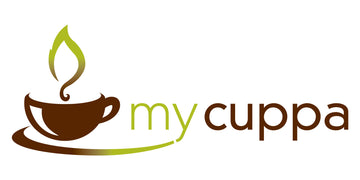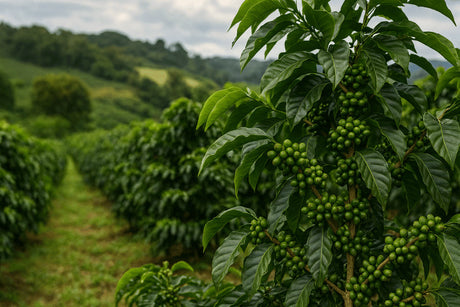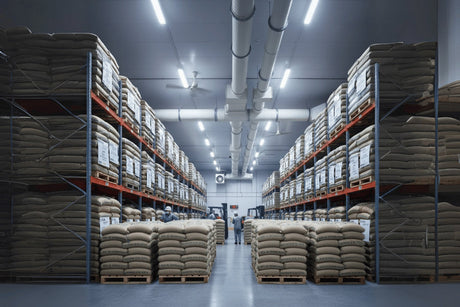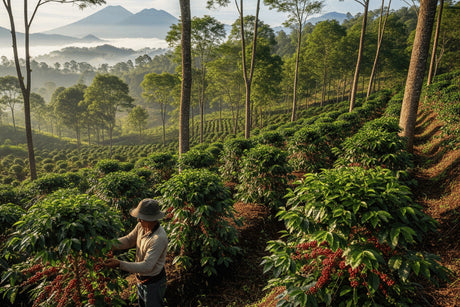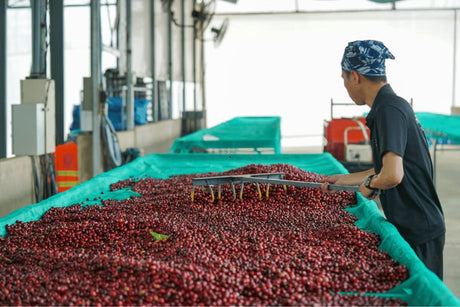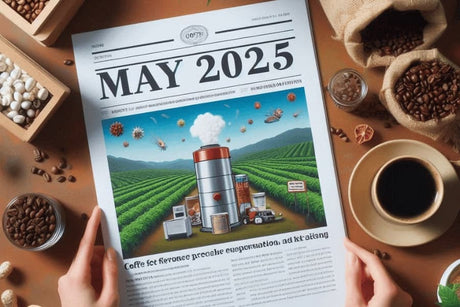mycuppa June 2022 Newsletter
Change. It's all around us whether we want it or not.
Like all businesses, we deal with change every day.
While sometimes it might be small, like switching a single bean in a 4-bean coffee blend, it could also be a more significant decision to discontinue a famous coffee in our line-up when securing adequate future supply becomes impossible.
But whatever the reason, we are living in a dynamic environment where conditions are forever shifting and moving around in what seems like increasingly shorter cycles, so we do what everyone else must also do, whether it's a business or an individual - you find the best way to adapt and optimize.
Often, it's a change forced upon us unexpectedly, or we have to make difficult choices in the best interests of our customers and company, like switching off a shipping provider when the incident rates are intolerable.
In April and early May, we experienced a harrowing period of chronic freight issues resulting in abnormal parcel transit delays and, in some cases, inevitable complaints - we expected some pain due to the calendar of stacked holidays.
The parcel network problems in late April and early May were why we decided not to publish a May Newsletter.
However, we did manage to release a sensational May Secret Label that has since sold out.
Hopefully, that's all well and truly behind us, as we have seen significant improvements over the last month. I
t certainly provides an exciting insight into how upcoming public holiday periods might perform - speaking of which, we have one coming up in a few days, so please consider planning as these events are rarely incident-free.
We are changing.
There was a reason we picked those famous Bowie lines.
After 15 years of selling high-quality, fresh-roasted coffees online as the original pioneer of premium coffees delivered to your door, we are embarking on a new journey to transform how we do things.
It's pretty epic, and we are excited, but it is also a massive mountain of work, and there will no doubt be some bumps along the journey.
Over the coming months, mycuppa will change and look different. We are still determining how long it will take and, as always, do our best to give our beloved customers plenty of notice.
Our core values of exceptional quality, freshness, speed and unbeatable value won't change. However, we may package and present our offerings differently.
Secret stuff.
This month's Secret Label is about moving back into the realm of acids. Black coffee lovers need not fear; it will always crafted to avoid puckered cheeks and squinty eyes.

The race for alternative energy to roast coffee.
Manufacturers of coffee roasting platforms have been promising for a long time - or doing their best to pretend they are genuinely committed to sustainability and the environment.
There are plenty of green initiatives on presentation slides to help tick the responsibility boxes, but something tangible regarding solutions customers can deploy is needed.
The only real breakthrough in the last ten years has been a recent ability to use heat re-circulation as a method of potential energy savings.
Still, the promoted benefits are always grossly overstated and exaggerated - roasting coffee produces contaminants such as smoke, odour and husks that must be "burnt off", and even closed-loop systems run at high temperatures to achieve this objective.
Then, there is still that loud cultural war raging inside the coffee industry about how re-circulation generates a "dirty tasting cup" as contaminates, and taints are re-directed back into the roasting air stream and allegedly absorbed by porous coffee beans instead of released into the atmosphere.
Purists love academic debates.
Just like our recent change of government here in Australia, it was becoming more and more challenging to hear these hollow promises from roasting equipment vendors of "caring about being green" uttered in the same sentences as bragging rights of their 14-month order backlogs.
All for solutions using the same roasting systems they have been building since they started.
Most things have stayed the same in 150 years of coffee roasting technology.
There are still the same big lumps of metal, a few motors with rotating parts and, of course, the fuel-based heat source, which has predominantly been one of the readily available residential or commercial gases (Natural or propane).
Gas is used in roasting because it allows quick adjustments from 0 to 100% and back.
There have been a few experiments on the outer fringes of coffee roasting platforms with induction, wood-fired, diesel, coal and electric.
Still, all have resulted in relative failure to gain broader acceptance and adoption.
So why has it been so hard to shift the global coffee-roasting community off its monster appetite for gas?
The answer lies in understanding that roasting coffee is a precise science requiring incredible accuracy of the heat application.
Unlike cooking in an oven, BBQ or open fire, roasting coffee has almost zero tolerance for failure, and it's never a "set and forget" methodology despite all the computer wizardry.
Every second of a typical 12 - 18 minute roasting batch is critical. When you factor into the equation that each coffee can behave differently, and depending upon the platform's design, these differences can still exist from batch to batch of precisely the same coffee roasting in the same session (day).
You begin to appreciate this roasting gig is never easy; in fact, it's damn hard to keep everything under control.
Environmental factors like temperature and humidity also play a significant role in trying to throw the roasting operator off their game.
Melbourne has a reputation as a roasting capital; it also has crazy weather!
When it's not under control, the result is undoubtedly noticeable - the coffee will take on undesirable attributes that may involve lacking flavour, body, aroma, sweetness, etc.
Coffee is a delicate product that requires proper handling.
A small error during the roasting process can lead to disastrous results, resulting in substandard products that no one will want to purchase.
Ideally, companies should take pride in their products and strive to deliver only the best to their customers.
Electric roasters are typically used for smaller-scale applications like sample or micro-roasting.
Like an electric cooktop, there's so much lag in controlling the heat transfer.
Efforts to extend the capacities of electric platforms have been unsuccessful, but the struggle continues to push the capabilities, and you can never say never.
Bio-fuels are interesting, but we are yet to see broader adoption, so the demand remains low.
When a roasting manufacturer designs a new roasting platform, they want it to last at least 20 years, and they need to sell dozens or hundreds, not just a handful.
The focus and attention to inventing the world's first "green" coffee roaster has intensified in the last six months.
Perhaps it's the roaster manufacturers watching the critical inflection point underway in the global motor vehicle industry as internal combustion engines are rapidly discarded in favour of electrification. If they don't shift, the market will leave them behind.
Hydrogen roasting plants are emerging as the new "buzz" word in coffee roasting.
You can't buy one today, and no designs are released online.
However, talk is gaining momentum and determining how the quality and consistency will stack up against a gas-powered equivalent.
Like all new technologies, we should be prepared for those evangelical debates of the pros and cons, primarily by blow-hard know-it-alls without direct experience or knowledge.
One of the largest and oldest manufacturers (Probat) sneaked out a snippet weeks ago when releasing their new Neptune 1000kg per hour roasting system (gas-powered). Probat mentioned around October that they hope to release plans for a revolutionary new "green" coffee roaster powered by hydrogen.
Still, it's likely to be just a tiny platform - probably a 5kg batch size, which makes it not commercially viable for coffee roasting companies - at least it's a promising starting point.
As a giant coffee roaster, we are a significant consumer of commercial natural gas in Victoria (perhaps at times up to the equivalent of a small suburb).
This leaves us and our coffee-roasting colleagues heavily exposed to the wild fluctuations of tariff volatility that seem intent on protecting the far more significant numbers of residential consumers and penalising the smaller groups of business and commercial users that use higher volumes.
The invasion of Ukraine has had a significant impact on the energy supply game, as Russia's majority control over gas resources in parts of Europe, especially Germany, is now considered a significant risk.
It's ironic that Probat, based in Germany, is caught up in this situation, hence the scramble for alternatives.
Business and commercial users are paying huge premiums for natural gas to subsidise the residential market.
If residents were paying the same rates as us for natural gas, there would be outrage, major revolt and scandal.
At eye-watering 300% increases for natural gas compared to only four years ago, with forecasts set to rise to 400% in the coming months, it's hard to reconcile our residential gas rates being a staggering 170% cheaper than commercial.
High-volume commercial users also pay upfront for all the gas infrastructure, such as meters and cages, etc., to be charged almost double the rate of residential consumers for the same natural gas - hardly fair.
It would be the other way around in any other industry or market. You only need to see the media with plenty of businesses shutting down due to the high gas supply costs over the last four years.
It's hard to see how this has gone wrong - large gas users with no bargaining power and federal and state governments disregarding the crippling impact - probably because it doesn't affect voters.
The governments will pretend to help businesses, but they won't implement the regulations to help lower the cost of manufacturing; it's all about creating more temporary jobs and rubbery accounting.
Today, it's tough to be a green coffee roaster.
Some of our competitors enjoy "stretching the truth" in marketing claims of their environmentally friendly platforms - inevitably, they are roasting with gas just the same as we do, and they also need a similar relative volume of energy to covert the raw coffee into roasted - basic theory of heat exchange doesn't change.
When the new generation of green roasting platforms becomes available, we are confident that.
There will be no compromise on quality and consistency; rest assured that we will always be at the forefront of the queue.
